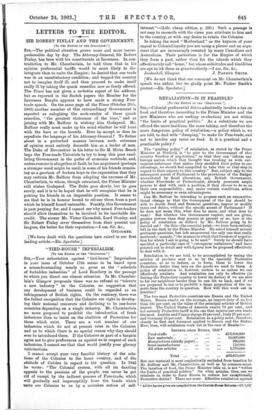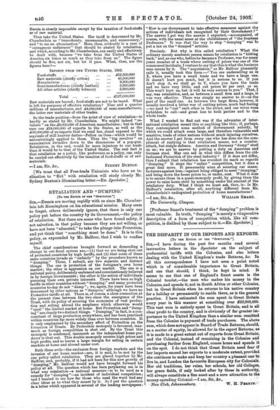RETALIATION—IS IT FEASIBLE?
[TO THE EDITOR OP THE "SPECTATOR."]
Srn,—Colonial preferential duties admittedly involve a tax on food, and therefore (according to the Prime Minister and the new Ministers who are seeking re-election) are not within "the limits of practical politics." As a substitute we are offered the more insidious, the more taking, and therefore the more dangerous, policy of retaliation,—a policy which is, we are told, to deal with "dumping," to make for Free-trade, and not to involve any taxes on food. Is it a practical and a practicable policy ?
The "guiding policy" of retaliation, as stated by the Prime Minister at Sheffield, is "to give to the Government of this country freedom of negotiation," so that they can "inform any foreign nation which they thought was treating us with out- rageous unfairness that unless they modified their policy to our advantage, we should feel compelled to take this or that step in regard to their exports to this country." But, subject only to the subsequent assent of Parliament to the provisions of the Budget necessitated by fiscal alterations, any British Government, whether Free-trade or Protectionist, already possesses ample powers to deal with such a position, if they choose to do so on their own responsibility; and, under certain conditions, action might be necessary or even advantageous.
Can Mr. Balfour be intending to propose such an unconstitu- tional change as that the Government of the day should be. able to decide fiscal and financial questions, impose or modify taxes and duties, without the specific assent of Parliament ? If he does not mean this, what does he mean, and what does he want? But whether the Government require, and are given, greater powers than they possess at present or no, how is the policy of retaliation as defined by Mr. Balfour going to be carried out? On this—the essential point—we have been entirely left in the dark by the Prime Minister. He asked himself several pertinent questions, but left unanswered the only one that really. mattered,—namely, " the manner in which that freedom of negotia- tion for which I ask is going to be used." Surely he should have specified a particular case of "outrageous unfairness," and have pointed out in detail and with figures how he proposed effectively to deal with it.
Retaliation is, we are told, to be accomplished by taxing the articles of produce .sent to us by the specially Protective countries, so as to induce, or to force, them to lower the Protective duties they levy on the goods we send to them. A policy of retaliation is, however, useless to us unless we can effectively retaliate. And retaliation can only be effective (in forcing the Protective country to lower its duties) if we are able to hit our neighbour harder than he can hit us back, and if we are prepared to tax or to prohibit a large proportion of the im- ports from the country in question. How will this work out in practice ?
The two most Protective countries are Russia and the United States. Russia exacts, on the average, an import-duty of no less than 131 per cent, on the value of the principal articles of British import. The United States of America exacts 73 per cent., and her severely Protective tariff is the one that injures our own trade the most. Austria and France charge 35 percent., Italy 27 per ctnt., and Germany 25 percent. Retaliation as a policy must, therefore, clearly be first and foremost applied to Russia and the States. How, then, will retaliation work out in the case of Ruasia ?—
IMPORTS FROM RUSSIA, 1902.*
Food-stuffs ••• • • • 413,500,000
10,000,000
Manufactures (chiefly paper)...
290,000 Semi-manufactures
••• 110,000 All other articles ...
••• 1,770,000 Total ...
425,670,000 But raw material is most emphatically excluded from taxation by Mr. Balfour and Mr. Chamberlain, as well as by common-sense. The taxation of food, the Prime Minister tells us, is not "within the limits of practical politics." On what articles, then, can we retaliate in order to force Russia to reduce her exceptionally Protective duties? There are none. Effective retaliation against
• .L11 the figures given are compiled from the Custom Nouse Beturus.—Cd.1,61I
. . Russia is clearly impossible except by the taxation of food-stuffs or of raw material.
Then take the United States. Her tariff is denounced by Mr. Chamberlain as "immoderate, unreasonable, and unnecessary," and "to me an abomination." Here, then, evidently is a case of outrageous unfairness" that should be abated by retaliation, and which, according to Mr. Chamberlain, can easily and effectively be dealt with, because "we take from the United States of America six times as much as they take from us." The figure should be five, not six, but let it pass. What, then, are the figures here ?—
IMPORTS FROM THE 'UNITED STATES, 1902.
Food-stuffs ... X62,500,000 Raw materials (chiefly cotton) ... 45,500,000 Manufactures ... 9,300,000 Semi-manufactures (chiefly leather) 3,900,000 All other articles (chiefly tobacco) 5,800,000 Total ... £127,000,000 Raw materials are barred ; food-stuffs are not to be taxed. What is left for purposes of effective retaliation ? Nine and a quarter millions of manufactures, and £4,000,000 of semi-manufactures, the latter raw materials of other trades.
So the trade position—from the point of view of retaliation—is hardly as stated by Mr. Chamberlain. We might indeed " re- taliate " on the £9,000,000 of American manufactures ; but in that case our £24,000,000 of exports to the States, as well as the £19,000,000 of re-exports that we send her, stand exposed to the reprisals of still heavier duties—Pelion on Ossa—which would be unhesitatingly applied to them. Thus the "big revolver" on examination dwindles down to the dimensions of a pop-gun. Retaliation, in the end, would be more injurious to our trade than it would be to that of the United States. The real fact is that retaliation as a policy, like preference as a policy, can only be carried out effectively by the taxation of food-stuffs or of raw materials.
[We trust that all Free-trade Unionists who have an in- clination to "flirt" with retaliation will study closely Mr.
Sydney Buxton's illuminating letter.—En. Spectator.]























































 Previous page
Previous page